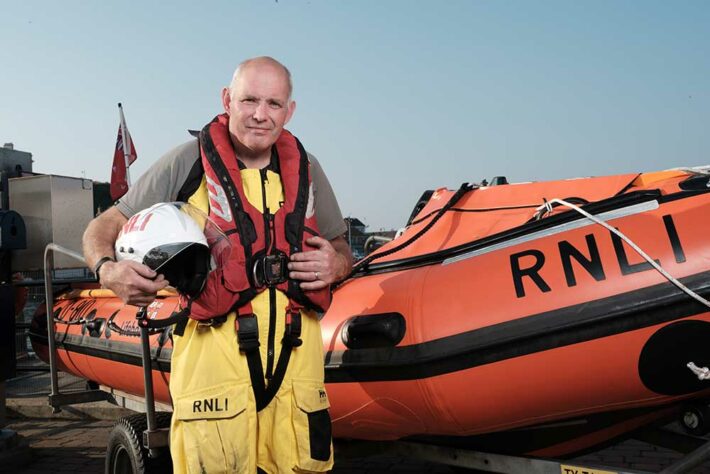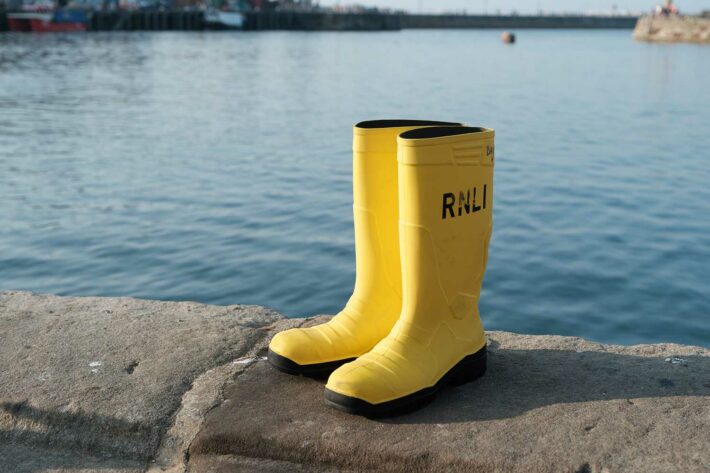Keith is 51 and lives in Whitby with his wife. As well as running his own busy plumbing business, Keith is a volunteer with the RNLI (The Royal National Lifeboat Institute) – a role that means he never knows when he’s going to get the call saying that someone needs his help at sea. Both jobs mean that Keith is always on his feet, but a small wound on his toe in 2020 very nearly put an end to this:
“I noticed this small, pea-sized blister on my big toe. I didn’t think too much about it, but it got worse and worse and became really painful to walk on. I decided to squeeze it and all this disgusting gunk came out. I took myself to A&E because I knew it wasn’t right. They dressed my foot and gave me antibiotics to clear up the infection. This helped for a bit but as soon as I stopped the antibiotics, the blister would come back. This went on for months”
Developing a diabetes foot ulcer
What Keith thought was a blister was actually a chronic foot ulcer, likely caused by a small cut on his foot and exacerbated by Keith’s foot neuropathy – a side-effect of his Type II diabetes. By the time Keith was referred to a podiatrist, the ulcer was so infected that it had caused osteomyelitis of the toe – a serious infection of the bone that can result in amputation.
“At one point, the podiatrist did talk about amputation. This probably would have put an end to the RNLI work because you need to be able to move around easily, and that’s hard when you’re missing a toe”

Getting the right care for treating a diabetes foot ulcer
Keith spent several months in the care of his podiatry team, at one point going into the clinic every other day to have his dressings changed. He was also seen by a nutritionist, who advised him on changes he could make to his diet to keep his diabetes under control. But it was a relatively small change that made a big difference to Keith’s foot health:
“My podiatrist said to bring in the shoes that I wore most often, which were my steel-capped boots for plumbing and my wellies for when I’m on the lifeboat. She made me a special set of foot beds for both pairs of boots. I just put them inside the boots, and it really helps takes the pressure off the big toe. She also told me to change my footwear more often and to regularly change the foot beds”
Healing Keith’s diabetes foot ulcer
15 months on, Keith’s ulcer is now fully healed which he put downs to the support of his podiatry team:
“They’ve just been brilliant. They know that if I’m called out on the boat, I have to go and that means I’ve missed appointments. My podiatrist actually gave me her mobile number and told me to just send her a text message if I couldn’t make it and they’d reschedule. It’s little things like that which have made a big difference”
Now healed and with his specially adapted wellies, Keith is also able to be fully present for his RNLI work

“The RNLI is an organisation that’s very close to my heart because they were there for my family many years ago. I started volunteering with them because I wanted to give something back. It can be a tough job and you never know what situation you’re going to face when you get the call. You’re often going into the unknown in horrendous conditions, but you just get out there and get on with it”
Keith’s advice to people with a foot wound that’s not healing is similarly no-nonsense:
“Just don’t ignore it! I should have seen someone much quicker. My foot was in a real mess by the time I took myself to A&E. Now I know how bad it was and how long it took to heal, I wish I’d acted sooner”
Want to know more?
Find out more about diabetes foot ulcers including what to look out for
Other support
If you’ve been affected by any of the issues raised in theses stories, the following organisations may be able to provide help and advice.
Royal College of Podiatry The Royal College of Podiatry exists to ensure the public has access to high quality foot care delivered by qualified and regulated professionals.
Contact details
020 7234 8620
reception@rcpod.org
Find out more on the Royal College of Podiatry website
Foot in Diabetes UK Part of Diabetesonthenet.com Foot in Diabetes UK is an organisation dedicated to continuous improvement in the care and management of people with diabetic foot problems.
Contact details
020 3735 8244
info@diabetesonthenet.com
Find out more on the Foot in Diabetes UK website
Diabetes UK Diabetes UK are the leading UK charity for people affected by diabetes it’s their responsibility to lead the fight against the growing crisis. And this fight is one that involves all everyone – sharing knowledge and taking diabetes on together.
Contact details
0345 123 2399
helpline@diabetes.org.uk
Find out more on the Diabetes UK website
Samaritans Samaritans are there 24 hours a day, 365 days a year providing emotional support to anyone in emotional distress. Call them free any time, from any phone.
Contact details
116 123
jo@samaritans.org
Find out more on the Samaritans' website
Mind Mind is the UK’s leading mental health charity. They're there to make sure no one has to face a mental health problem alone you can call or text for free anytime.
Contact details
0300 123 3393 or text 86463
info@mind.org.uk
Find out more on the Mind's website
Tell us what you think
If there’s anything you want to ask us or tell us, whether it’s a suggestion about our website, a complaint, or a compliment, drop us a line at
support@legsmatter.org









